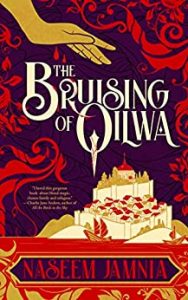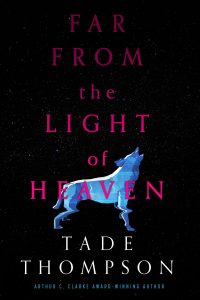Alex Brown Reviews The Bruising of Qilwa by Naseem Jamnia
 The Bruising of Qilwa, Naseem Jamnia (Tachyon 978-1-61696-378-1, $15.95. 192pp, pb) August 2022.
The Bruising of Qilwa, Naseem Jamnia (Tachyon 978-1-61696-378-1, $15.95. 192pp, pb) August 2022.
With Naseem Jamnia’s debut novella, The Bruising of Qilwa, we get blood magic, dark secrets, political upheaval, body dysmorphia, and imperial oppression as much as we get queer love, true friendship, and self-acceptance.
Firuz-e Jafari, introduced as they-Firuz, works blood magic in their homeland of Dilmun. When a plague sweeps through the land, they and their family join the stream of refugees pouring into the neighboring nation, the Free Democratic City State of Qilwa. Most Sassanians settle in tenements and shacks in the filthiest part of the city and struggle for employment, in part because the Qilwans are suspicious of the people from Dilmun, who once ruled over them. Soon enough, Firuz finds a job at a clinic run by a pleasant health-care worker called Kofi. He runs one of the only clinics that will treat Sassanians, so the two are always busy. It also gives Firuz a chance to work their blood magic without drawing attention.
At home, things are complicated. Their mother is always out. Their younger brother, Parviz, struggles with body dysmorphia and wants Firuz to spend more time developing a spell to help him physically transition. Firuz also collects a teen girl, Afsoneh, who may end up being an even more powerful blood mage than Firuz, but who is less cautious about who sees her work and what spells she casts. While all this is going on, the local mortician keeps finding corpses that don’t decompose, and two plagues race through Qilwa. The first seemingly burns itself out, but the second spreads rapidly. Lethargy and malnutrition appear alongside huge, ugly bruises as the body attacks itself. Firuz discovers that this strange bruising disease is fueled by a parasitic spell, and the only way to fight it is to expose themself as a blood worker, the very thing the Qilwans fear the most.
Despite its short length, the world building in The Bruising of Qilwa is exquisite and original. Jamnia doesn’t give a lot of detail about the world or its political and cultural histories, yet the story feels vast. It’s as if this is an excerpt from a larger book about Firuz’s life as a refugee and immigrant. The magic system is especially intriguing, and Jamnia gives readers several scenes of Firuz, Afsoneh, and the antagonist manipulating the physical world with their magic. We see how it interacts with (and often overpowers) the human body, how it connects people to each other and their community, how it gives freedom and demands isolation in equal measure, how it can be a tool to aid, a medicine to treat, or a weapon to harm.
In the Afterword, Jamnia explains the origins of the novella, both in terms of where the story idea came from and how their experiences and history as a Persian Iranian immigrant expanded it. ‘‘What did such accomplishments mean when there were still subjugated people under our care? But what did it also mean that while we had once been an empire, we were now a hated people?… As [the protagonist and antagonist] began the story, so they conclude it: a marginalized person in a country afraid of its own recolonization.’’ That tension runs through the veins of The Bruising of Qilwa.
Firuz is a refugee eking out a life in an empire, but they are also from a former empire who once ruled over the land where they now reside. Most of the oppression their people now experience stems from simmering frustrations in their oppressors, left over from centuries of being oppressed by Firuz’s own people. This isn’t a tit-for-tat situation. It’s more complicated than that, as we see by the final act.
The colonized and the former colonizers both fear colonization, albeit for different reasons, and there is no firm boundary between who is who. All of the characters in this novella have been both colonizer and colonized, oppressor and oppressed. How they react to colonization is where the story blooms. Some, like Firuz, are willing to listen to other perspectives and see the contradictions in their own culture. Others, like the antagonist, see only power dynamics, what can be taken by force, and what must be sacrificed. Neither are inherently wrong or right. As Jamnia also says in the Afterword, there are no heroes or villains in a story like this, only complicated people making choices for reasons even they might not fully understand. To reduce everything down to a binary is to miss the point. Processing socio-cultural trauma and systemic oppression is at the heart of the story.
The cover copy is deceptively simple. It makes The Bruising of Qilwa sound like an interesting yet recognizable second-world fantasy story. But there’s nothing simple about this novella. Naseem Jamnia has threaded themself – their identities, their experiences, their histories, their culture – into every layer of the narrative. Books like this are why I read almost exclusively science fiction, fantasy, and horror by authors with marginalized identities, particularly BIPOC and queer/trans/nonbinary. I love seeing how we can take the familiar and reshape it into something wholly new just by imbuing it with our unique perspectives. The future of fantasy fiction is in our hands.
Alex Brown is a queer Black librarian and writer. They have written two books on the history of Napa County, California’s marginalized communities. They write about adult and young adult science fiction, fantasy, and horror as well as BIPOC history and librarianship. Diversity, equity, inclusion, and access set the foundation of all their work. Alex lives in Southern California with their pet rats and ever-increasing piles of books.
This review and more like it in the Sepetmber 2022 issue of Locus.
 While you are here, please take a moment to support Locus with a one-time or recurring donation. We rely on reader donations to keep the magazine and site going, and would like to keep the site paywall free, but WE NEED YOUR FINANCIAL SUPPORT to continue quality coverage of the science fiction and fantasy field.
While you are here, please take a moment to support Locus with a one-time or recurring donation. We rely on reader donations to keep the magazine and site going, and would like to keep the site paywall free, but WE NEED YOUR FINANCIAL SUPPORT to continue quality coverage of the science fiction and fantasy field.
©Locus Magazine. Copyrighted material may not be republished without permission of LSFF.





